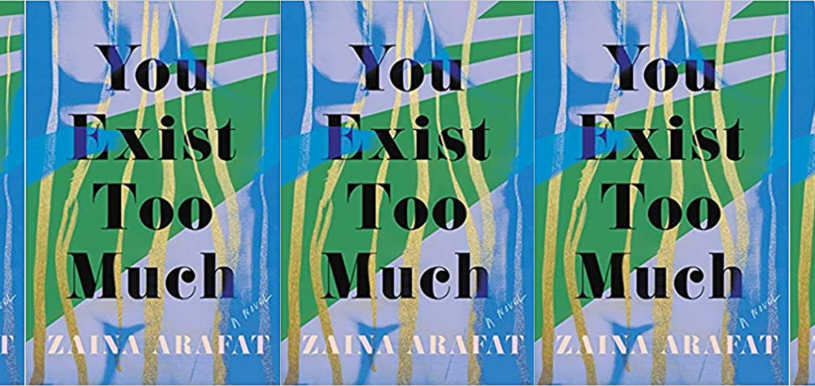By Zaina Arafat
Rating: 4 Stars
Goodreads Rating: 3.70
Genre: LGBTQ Adult Litfic
Publication Date: June 9th 2020
Format Read: Audiobook
Goodreads Summary: On a hot day in Bethlehem, a 12-year-old Palestinian-American girl is yelled at by a group of men outside the Church of the Nativity. She has exposed her legs in a biblical city, an act they deem forbidden, and their judgement will echo on through her adolescence. When our narrator finally admits to her mother that she is queer, her mother’s response only intensifies a sense of shame: “You exist too much,” she tells her daughter.
Told in vignettes that flash between the U.S. and the Middle East–from New York to Jordan, Lebanon, and Palestine–Zaina Arafat’s debut novel traces her protagonist’s progress from blushing teen to sought-after DJ and aspiring writer. In Brooklyn, she moves into an apartment with her first serious girlfriend and tries to content herself with their comfortable relationship. But soon her longings, so closely hidden during her teenage years, explode out into reckless romantic encounters and obsessions with other people. Her desire to thwart her own destructive impulses will eventually lead her to The Ledge, an unconventional treatment center that identifies her affliction as “love addiction.” In this strange, enclosed society she will start to consider the unnerving similarities between her own internal traumas and divisions and those of the places that have formed her.
Opening up the fantasies and desires of one young woman caught between cultural, religious, and sexual identities, You Exist Too Much is a captivating story charting two of our most intense longings–for love, and a place to call home.
Find the Book: Goodreads | Amazon | Book Depository
Review
“You Exist Too Much” is the story of a bisexual Palestinian-American woman as she deals with the fallout of her emotional and familial relationships. The story incorporates some flashbacks to her time in Palestine/Israel/Jordan, but primarily focuses on her time as an adult in New York City. The MC is a compulsive cheater, deeming herself a “love addict” and after she comes out to her mother (it didn’t go well) and simultaneously with her long term girlfriend finding out she was cheating, she checks herself into an addiction center.
The story then follows her journey at the addiction center and with love afterwards. I found the part of the book post-addiction center to be the most compelling from both a romantic and family relationship level, and I honestly kind of wish that it had started there and merely incorporated flashbacks from the treatment center.
This story was incredibly well written and I think that the plot was compelling, but for some reason I felt that I couldn’t get close to the character. Huge disclaimer there that I am white, and so perhaps other people who are Palestinian would have more of a connection with the main character and her story. But to add to my opinion that she was just not written in a way that reached out to the audience, she never even had a name. I’m sure this was an intentional choice, but little things like this kept me at a slight distance from her.
This book got four stars from me primarily because the story was so interesting. It was a story that I haven’t seen told a lot, especially from a female LGBTQ+ perspective, and so I enjoyed the narrative that was weaved together.
I’ve seen some reviews criticizing this book as biphobic for representing a cheating bisexual (a common stereotype is that all bisexuals will cheat), but I would like to play my bi card and refute that! I do understand where people are coming from by Arafat never made the MC’s bisexuality be a reason for cheating, nor was it ever used as an excuse. It simply was a character trait that the MC had, and I don’t think it’s fair to say that we cannot tell this particular story with a bisexual character merely because it aligns with some stereotypes. Representation can be Good Rep and have characters that we don’t want to be!
The other thing I appreciate from this book with respect to the bi rep is that relationships with both men and women were shown on the pages! Too often authors create bi characters and then they only ever date 1 gender (which is 100% fine) but allude to past relationships with other genders- it’s the allusion without payoff that I find annoying. Arafat did not do that, showing us relationships with people of multiple genders over the course of the MC’s love journey.
I enjoyed reading a book about a deeply damaged character who, while at times depressed, wasn’t coping merely by curling up in bed and never leaving their house. The damaged protagonist era is something I am deeply obsessed with and I enjoyed a fresh take on a genre that was becoming a bit oversaturated.


Hypnotically meandering narrative structure. Deeply compelling protagonist. Lovely sentences, in it’s own way.
LikeLiked by 1 person
Yes to all this! I agree with all of it, especially everything you said about the bi aspects. I (also bi) thought it was just a really fascinating character story and I actually really liked the rep. Anyways – thanks for sharing your review. I feel like this book just doesn’t get enough love and I am always excited to see someone else who agrees. 🙂
LikeLiked by 1 person
I’m so glad you agree!! this book definitely doesn’t get as much attention as it deserves
LikeLiked by 1 person